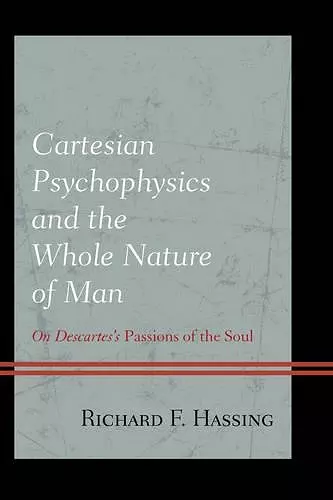Cartesian Psychophysics and the Whole Nature of Man
On Descartes’s Passions of the Soul
Format:Paperback
Publisher:Bloomsbury Publishing PLC
Published:31st Aug '17
Currently unavailable, and unfortunately no date known when it will be back

In The Passions of the Soul Descartes proclaims his intention to explain the passions “only as a Physicist,” and titles Part I “About the passions in general, and incidentally about the whole nature of man”—not an incidental item. Two questions orient the present inquiry: What does Descartes mean by “the whole nature of man,” and how does a general theory of the human emotions based on his physics account for it? Not surprisingly, Descartes does not fulfill the letter of his intention; rather, he explains the passions “only [partly] as a Physicist.” The other part of his study—irreducible to any physics—consists in his own analysis of the life of the human being as union of soul and body. The resulting account is an unusual combination of scientific (hypothetico-deductive) psychophysics and prescientific insight into human experience. In it, a quasi-mechanical theory of the impact of imagination on passion and volition is combined with a distinctive emphasis on the human propensity to esteem what we imagine to be great. Human history and therewith “the whole [problematic] nature of man” is constituted in significant measure by the particular and variable objects of esteem. The correction and improvement of our nature is the aim of Descartes’s culminating doctrine of the one thing that is truly estimable: the firm and constant resolution to use well (autonomously) one’s own (individual) powers of cognition and volition. With the return of religious war The Passions of the Soul is newly relevant.
Richard Hassing’s monograph is to my knowledge the first full-length study of Descartes’s Passions of the Soul…. Hassing’s excellent study should be of interest not just to Descartes scholars, although that group clearly is its primary intended audience, but to anyone interested in the Cartesian origins of modern self. * Review of Metaphysics *
Hassling’s carefully argued book will be of great use to anyone attempting to wrap their arms around the whole of the Cartesian corpus, the mechanics of the Cartesian self, the history of neuroscience, and the implications of all of the above for human freedom and autonomy.... The jewel of this book, though, is Hassing’s extremely careful treatment of Descartes’s psychophysical model of the human being.... This is a dense, carefully argued, and finely focused book that draws material from throughout the Cartesian corpus and offers a persuasive holistic interpretation of a centrally important idea.... [A]n extremely useful and thoughtful book. It should become required reading for anyone seriously interested in these matters. * The Review of Politics *
Richard Hassing's much-awaited book is an important study of Descartes's account of human psychophysical unity and its rejection of Aristotelian hylomorphism, i.e., the soul as general and holistic biological principle. Demonstrating impressively that the Passions of the Soul is both a scientific account of the emotions and a prescientific or phenomenological inquiry into "the whole nature of man," Hassing contests common conceptions of Cartesian substance dualism. Moreover, he reveals that Descartes's philosophic goal is to develop a therapeutic "highest and most perfect moral science" of the passions, employing esteem to ameliorate the disorders of a world wracked by religious conflict. This is a deeper account of Descartes's project than one has possessed hitherto, one that treats a strikingly timely set of questions. -- Richard Velkley, Celia Scott Weatherhead Professor of Philosophy, Tulane University
Richard Hassing presents in this volume the rich, sweeping, sometimes unprecedented harvest of his decades-long study of Descartes. He shows how Descartes derives from an all-too-familiar metaphysics and physics a sophisticated, all-too-unfamiliar conception of 'the whole nature of man' and 'the highest and most perfect moral philosophy.' Descartes himself experienced as a 14-year-old boy the funeral of Henri IV, assassinated at the hands of a religious fanatic, and Hassing shows here how Descartes’s mature conception of generosity rests on an individualism that vaccinates against extremism. He suggests that we today, our souls scarred by the likes of 9/11, may well return with new awareness to Descartes’s diagnosis of—and therapy against—'the greatest crimes man can commit.' -- Stephen Voss, Bogazici University
ISBN: 9781498522373
Dimensions: 232mm x 148mm x 19mm
Weight: 367g
278 pages